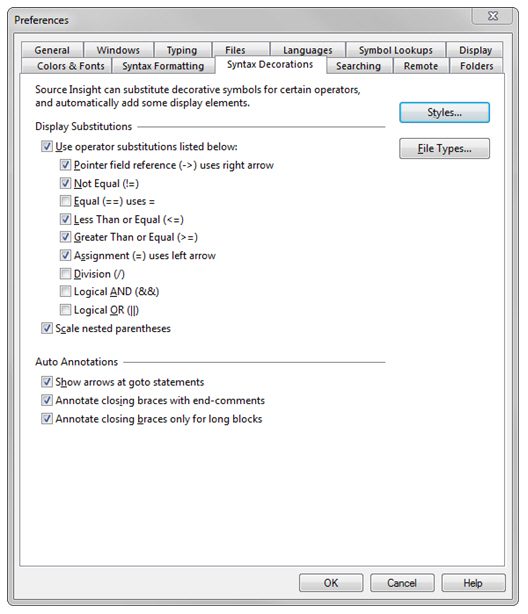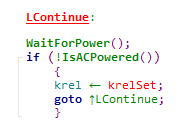This command specifies syntax decoration options for displaying source files. It activates the Syntax Decorations page of the Options > Preferences dialog box.
Source Insight can replace some common operators with more useful symbolic characters. The Syntax Decorations command lets you control which decorations are used. See: Syntax Decorations.
It's important to remember that symbol decorations and substitutions do not change the text in the source file; only its representation on the screen changes to show the special symbols. You still need to type the operators normally when editing your code, or when searching for them.

Display Substitutions
This group of options controls which operators are substituted with special symbols.
User special operator symbol substitutions
This enables or disables the whole group of operator substitutions that appear below.
Pointer field reference uses right arrow
This replaces the -> pointer operator with an actual arrow like this ®. For example:

Not Equal
This replaces the != not equal operator with ¹.
Equal
This replaces the == equal operator with a mathematic EQUIVALENT character.
Less Than or Equal
This replaces the <= operator with £.
Greater Than or Equal
This replaces the >= operator with ³.
Assignment uses left arrow
This replaces the = assignment operator with ¬.
Division
This replaces the / division operator with ¸.
Logical AND
This replaces the && logical And with Ç.
Logical OR
This replaces the || logical Or with È.
Scale nested parentheses
Nested parentheses are shown so that outer levels are larger than inner levels. This makes it easier to visually identify matching parentheses.

Auto Annotations
Source Insight can automatically add certain annotations to your source code display. The following options control which annotations appear.
Show arrows at goto statements
This causes either an up or down arrow symbol to appear in goto statements next to the label name. The arrow indicates whether the indicated label is above or below the goto statement line.

Annotate closing braces with end-comments
This causes end-comment annotations to appear after closing curly braces. The end-comment contains a show description of the start of the block. For example:

Annotate closing braces only for long blocks
This suppresses the auto-annotated end-comments for blocks less than 20 lines tall.